HIGHLIGHTS: JUNE 28, 2024
• Strengthening relations with the Chinese food and ag sectors
• Advancing the Indonesian school milk program
• House passes appropriations packages with dairy positives
• Editor’s note: No Global Dairy eBrief next week
• IAG meeting slated as RAPP funding starts rolling
• USDEC presents to FAS trainees, updates Wisconsin Farm Bureau
• Safeguarding our Supply Chains Act
• Letter calls for administration action on East, Gulf Coast dockworkers’ contract
• Market Summary: Chinese dairy imports plunge in May
• USDEC’s latest International Demand Analysis
• Denmark slates livestock emissions tax
• Fonterra makes leadership changes
• Dairy news from Sub-Saharan Africa
• Kerry opens new string cheese plant
• Company briefs: Miraka, Danone, Saputo, DMK, Tirlán
Featured
USDEC leads China Business Development Mission
USDEC President and CEO Krysta Harden joined USDEC Chair Alex Peterson, Vice Chair Becky Nyman, 15 USDEC members, and key staff in Beijing and Shanghai this week on a first-of-its-kind business development trip with USDA-FAS focused on dairy. FAS joined forces with USDEC to develop and co-lead the five-day mission.
The visit to Beijing and Shanghai had two broad goals:
- Build and strengthen relationships between U.S. dairy suppliers and Chinese buyers.
- Promote U.S.-China agricultural trade relationships.
It sought to fulfill those goals by engaging—through a series of meetings and other events—with Chinese dairy importers, processors, dairy and business associations, USDEC’s partner Jiangnan University, and officials from both the U.S. and Chinese governments. That included meetings with the China Chamber of Commerce of Foodstuffs and Native Produce (CFNA), the Ministry of Commerce and the Ministry of Agriculture and Rural Affairs.
The right people for the mission
“As representatives of the U.S. dairy sector, the U.S. dairy farmers and processors who participate in these missions are excellent ambassadors and emissaries for the U.S. dairy industry,” said USDEC President and CEO Krysta Harden. “No one is better suited to highlight the care and quality the United States puts into producing such a large portfolio of high-quality dairy ingredients and cheese. No one is better suited to illustrate the U.S. commitment to serving China and other global markets looking to supplement their dairy supply.”
The mission made the mainstream media, with Reuters quoting Vice Minister of Commerce Wang Shouwen during a meeting with Harden. The vice minister said China welcomes dairy companies from all countries, including the U.S., to expand their business in the Chinese market.
Strong potential
Despite the overall reduced demand for dairy imports over the past two years, the market remains the third largest U.S. dairy buyer. China will continue to play an important role in global demand due to its large population, growing middle class, increasing urbanization, and limited per capita consumption. The Chinese government has set targets for the nation to become more self-sufficient in dairy, but consumer demand is still expected to outpace domestic production.
What follows are some of the images from the trip.
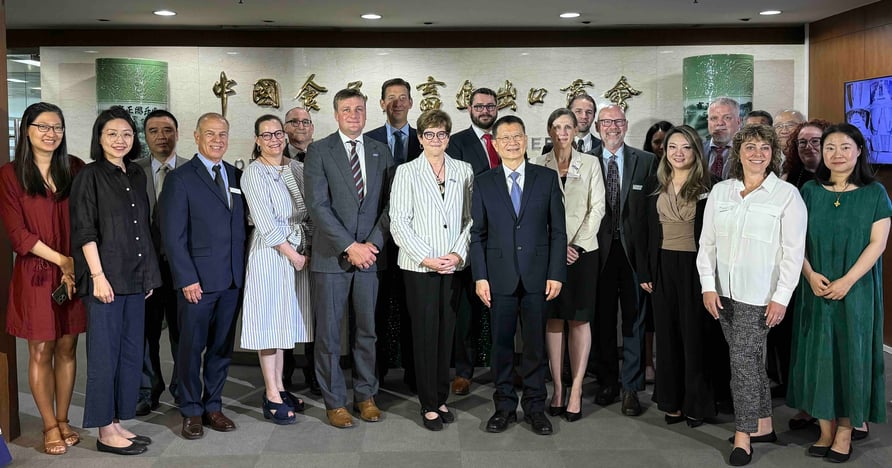
The U.S. delegation at CFNA during this week’s USDEC-USDA Business Development Mission to China.
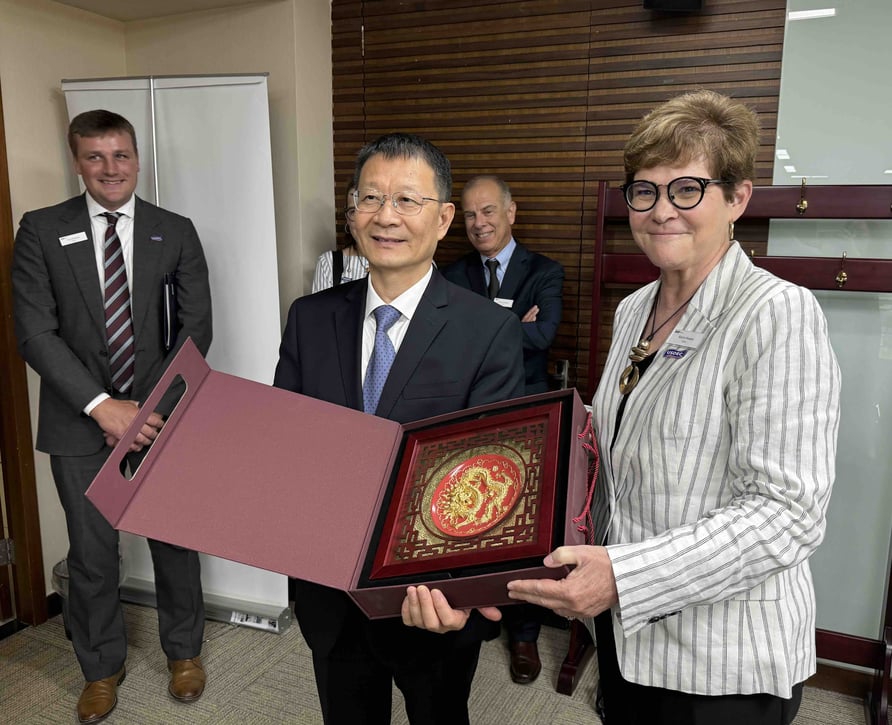
CFNA President Cao Derong presents USDEC President and CEO Krysta Harden with a gift to symbolize the cordial relationship between the two organizations.
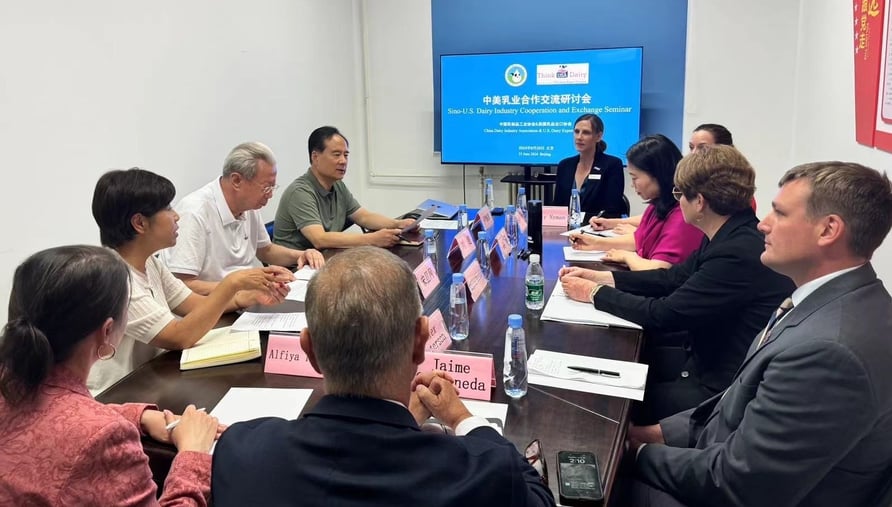
Leaders from the China Dairy Industry Association and U.S. dairy industry discuss China’s dairy industry needs and how the U.S. can help to support mutually beneficial consumption growth.
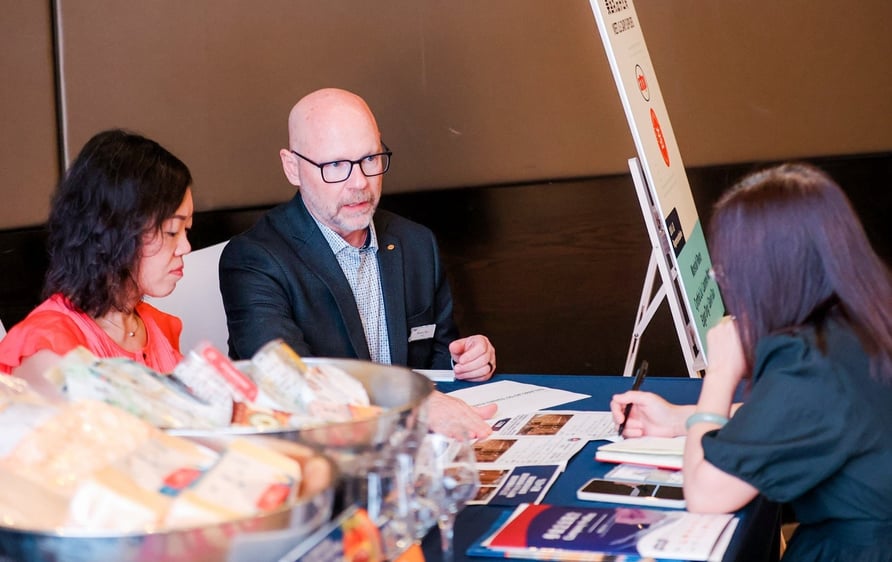
One of several meetings between U.S. dairy suppliers and potential Chinese buyers that took place at this week’s mission to China. Here (left to right), Cynthia Liu of Orange Cheese Co. and Marshall Reece of AMPI talk with a buyer representative about their product lines.
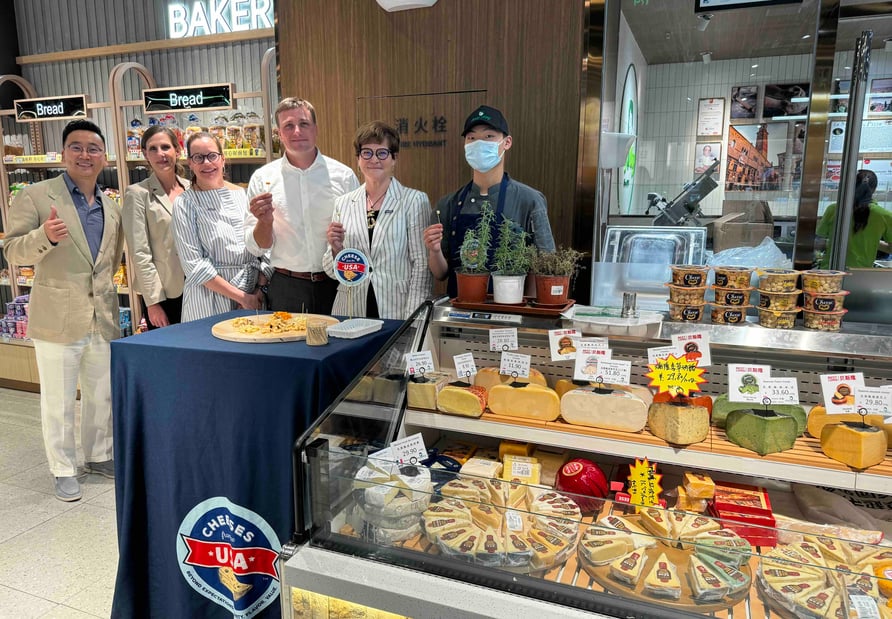
Mission participants visit an upscale grocery store in Beijing during one of the site visits. Left to right: Victor Sun, son of the store’s founder; Becky Nyman; Martha Scott Poindexter; Alex Peterson; Krysta Harden; and a store employee.
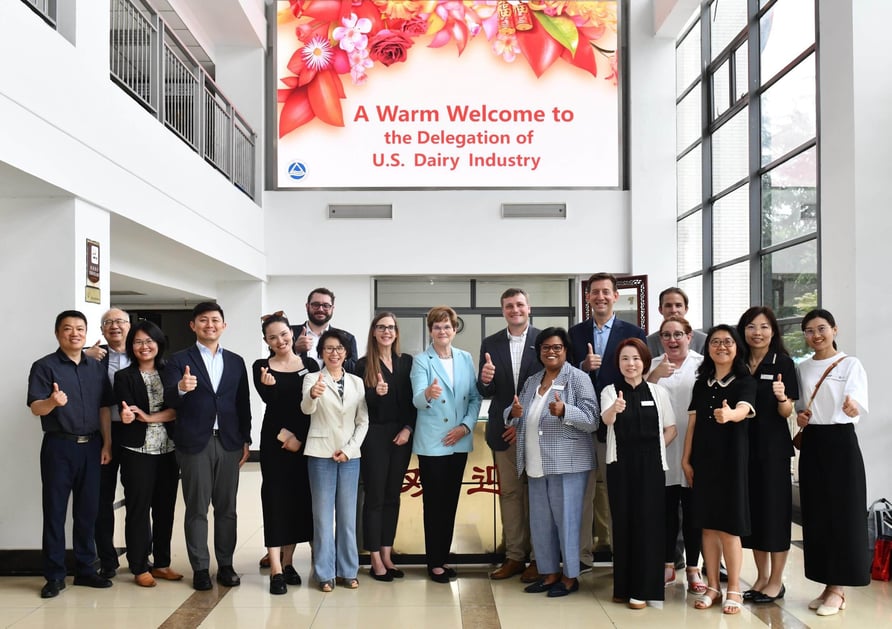
A visit to China’s Jiangnan University highlighted USDEC’s ongoing dairy partnership with the school.
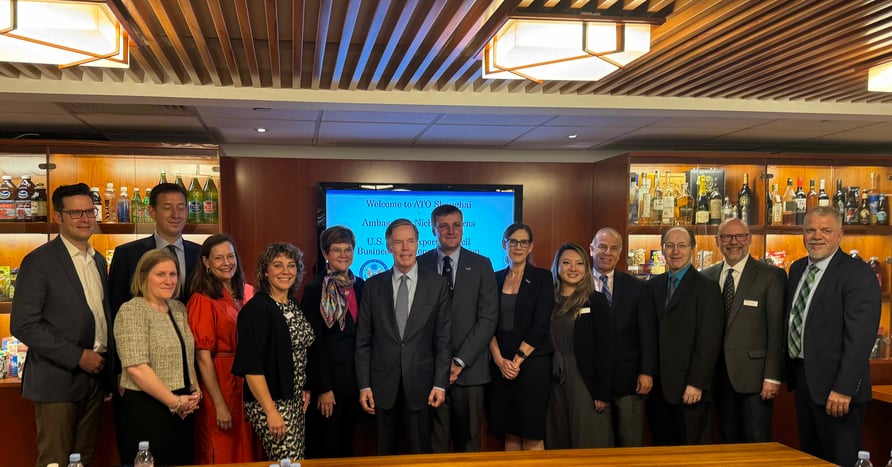
The USDEC-USDA Business Development Mission met with U.S. Ambassador to China Nicholas Burns (seventh from left) at the U.S. Consulate in Shanghai.
Morris, Gardner advance U.S. dairy partnership with Indonesia
USDEC’s Jonathan Gardner, senior vice president, Market Access and Regulatory Affairs, and Shawna Morris, executive vice president, Trade Policy and Global Affairs, led a U.S. delegation to Indonesia that took place over the past two weeks to strengthen U.S.-Indonesian collaboration in support of the new president’s school milk pledge. Incoming President Prabowo Subianto promised to provide nutritious meals and milk to all Indonesian school children during his campaign, which culminated in a comfortable victory during February elections.
USDEC had already laid the groundwork for assisting with the project in previous engagements with the government and industry. That includes a 2023 mission to Indonesia organized by the National Association of State Departments of Agriculture (NASDA) and attended by USDEC President and CEO Krysta Harden, as well as subsequent collaboration initiated with the Wisconsin Department of Agriculture, Trade and Consumer Protection (DATCP), the New Mexico Department of Agriculture (NMDA), and New Mexico State University (NMSU) to further U.S.-Indonesia trade and partnership. In addition, Gardner, USDEC Southeast Asia office chief Dali Ghazalay and representatives from NMDA and NMSU visited Indonesia earlier this year (see Global Dairy eBrief, 2/16/24).
Series of high-level meetings
Morris and Gardner met during the first week of the mission with several key government figures involved in delivering on the incoming president’s school milk pledge, including Coordinating Minister for Economic Affairs Airlangga Hartarto. Hartarto is responsible for overseeing and directing the actions of other agencies in Indonesia.
Additional meetings took place with former President Susilo Bambang Yudhoyono; House of Representatives member Budi Djiwandono, deputy chairman of the legislature’s fourth commission on agriculture, environment, forestry and maritime affairs; Deputy Minister of Trade Jerry Sambuaga; Director-General of Livestock and Animal Health Services for the Ministry of Agriculture Dr. Ir. Nasrullah; leaders from BPOM (Indonesia’s food and drug administration) and KADIN (the Indonesian Chamber of Commerce); and others.
“We wanted to deliver the message that the U.S. dairy industry strongly supports the concept of the school milk program and that we are committed to helping them turn that into a reality,” Morris said. “This was quite well received by the Indonesian government and industry leaders we met with. At a time when too many countries are scaling back their government recommendations and policies on dairy consumption, Indonesia’s charting a forward-looking path in a more positive direction.”
Gardner and Morris emphasized that the U.S. can best support the program in two ways:
- Providing educational outreach to Indonesia’s small-scale farmers by collaborating with leading academics and dairy cooperatives. During the second week of the mission, Gardner and representatives from NDMA and NMSU met with local academics and a dairy co-op to build out a detailed curriculum for Indonesian farmers, adapting U.S. materials to fit local needs. (USDEC is also coordinating with NASDA and Wisconsin’s DATCP on the broader effort. NASDA and DATCP are co-hosting a reverse trade mission for several Indonesian government and industry officials in conjunction with this year’s World Dairy Expo in Madison, Wisconsin, in October.)
- Supporting expanded local production with greater milk powder imports—a situation that could be facilitated by changes in Indonesian trade policy. That includes revamping Indonesia’s facility registration process to shorten or eliminate wait times (currently as high as four or more years), allowing sample shipments of up to 5 kg without plant registration or an import permit, and eliminating Most Favored Nation tariffs on milk powder imported for the program.

Morris and Gardner discuss school milk plans with Indonesia’s Coordinating Minister for Economic Affairs Airlangga Hartarto (second from left).
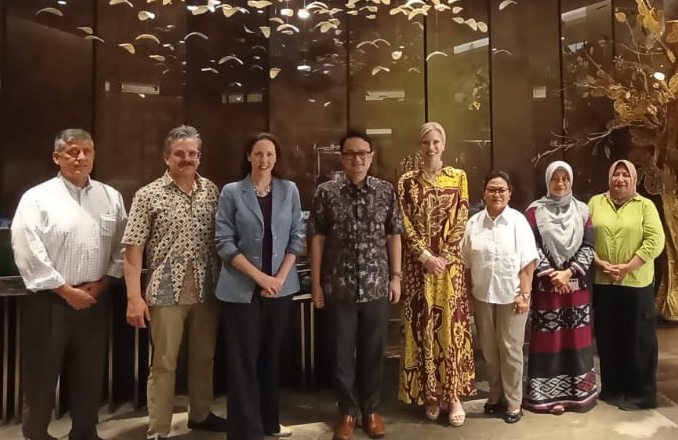
The USDEC-led delegation with Deputy Minister of Trade Jerry Sambuaga (fourth from left) and staff.
House passes appropriations packages with dairy export positives
USDEC commends the U.S. House for passing the Defense Appropriations Act and the State, Foreign and Related Programs Appropriations Act this morning with funding for programs that address U.S. dairy export needs. The former contains language that dedicates funding for a Homeland Security Investigations taskforce focused on the organized retail crime groups that are breaking into intermodal containers in transit. The latter act contains language that increases funding for ready-to-use therapeutic foods (RUTF) to $300 million for fiscal 2025. USDEC and NMPF strongly backed both measures and worked with congressional offices on the language and to build support for the bills.
Editor’s Note: Next issue July 12
There will be no Global Dairy eBrief on July 5 due to the holiday. The next issue will come out on Friday, July 12. Happy Independence Day!
Events
IAG webinar set for July 24 as RAPP activities begin to roll
The USDEC Ingredients Advisory Group (IAG) will hold a webinar next month to provide a mid-year status update on 2024 ingredients marketing activities as well as review USDA Regional Agricultural Promotion Program (RAPP) funding for supplemental projects in 2024 and 2025. The meeting takes place Wednesday, July 24, from 1:00-3:00 p.m. ET.
Preparations for the first RAPP-funded ingredient activities are already underway. USDEC’s Kristi Saitama, vice president, Global Ingredients Marketing, just returned from Taipei, Taiwan, where she and the Taiwan office kicked off planning for the new Taiwan ingredient marketing program.
USDEC Ingredients Advisory Group members had overwhelmingly ranked Taiwan, a health-conscious market with a dynamic food and beverage manufacturing sector, as the No. 1 new destination they would like to see USDEC pursue expanded activities with RAPP funding. Saitama met with USDEC’s Taiwan team to discuss 2024-2025 activities and conducted stores checks to get an updated pulse on promising protein product trends and opportunities.
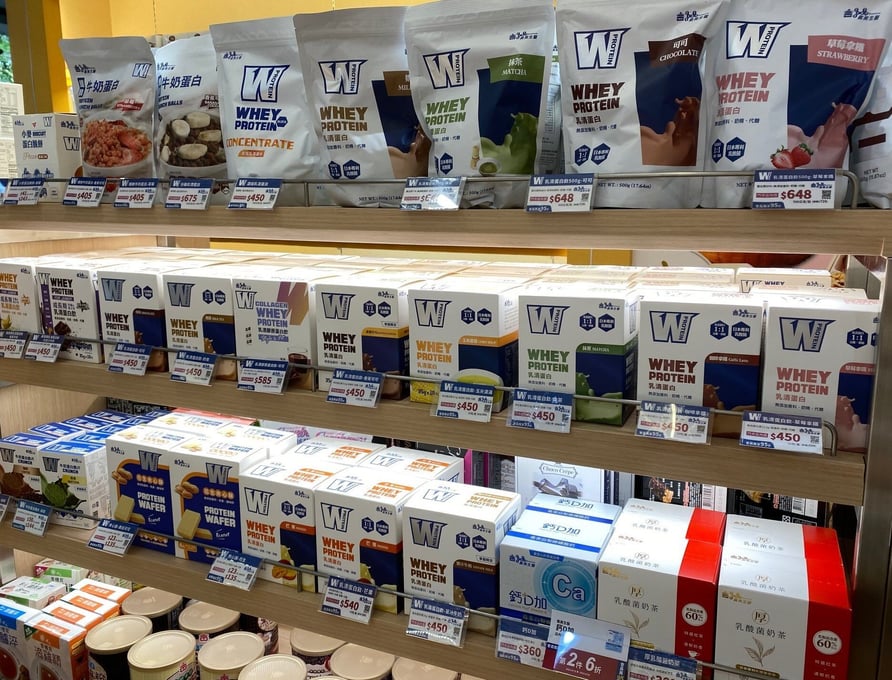
Whey protein products, including powders, soups and assorted snacks in a wide assortment of flavors and textures, lined three shelves of Taipei specialty retail shop of I-Mei Foods, a leading Taiwanese confectionery/snack manufacturer.
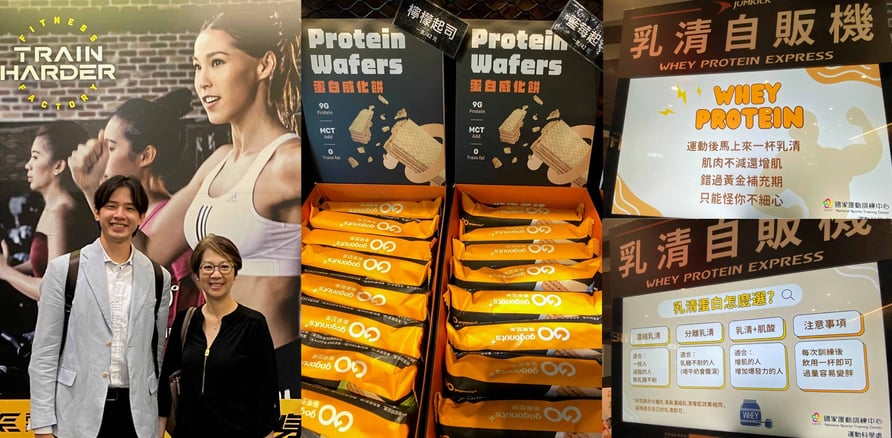
Local gym Fitness Factory had a large selection of whey protein products (bulk and single-serve powders, wafers, ready-to-drink beverages, etc.) and shared health information about whey protein. Terry Chang (left) and Rosaline Chen (right) of USDEC Taiwan say they are eager to begin promoting U.S. dairy ingredients in the market.
In other RAPP-funded ingredients efforts, Vikki Nicholson-West, senior vice president, Global Ingredients Marketing, will make USDEC’s first reconnaissance mission to Sub-Saharan Africa in July when she travels to Kenya. And USDEC’s All Dairy Supplier Mission to the Middle East/North Africa (MENA) region will take place from Nov. 16-23. With stops in Riyadh, Saudi Arabia; Cairo, Egypt; and Casablanca, Morocco, the trip will connect U.S. sellers with pre-qualified purchasing decision-makers from key dairy-buying companies and promote the U.S. dairy industry’s broad portfolio and reputation as trusted, progressive and innovative. The mission will include both U.S. bulk dairy ingredients and bulk and foodservice cheese.
For more information on the IAG meeting as well as the upcoming RAPP-funded activities, please contact Suzanna Stohr at sstohr@usdec.org.
USDEC staff provides dairy trade updates to FAS trainees, Wisconsin Farm Bureau execs
USDEC staff spent time with two U.S. ag groups this week in Washington, D.C., explaining what the organization does to support U.S. dairy exports and how dairy exports support U.S. farmers, processors and the overall economy.
Tony Rice, director, Trade Policy, and Bryan Jacoby, manager, Market Access and Regulatory Affairs (MARA), briefed FAS trainees, several of whom are preparing to head out to their global posts. The two provided an overview of the U.S. dairy industry, outlining the purposes of each of USDEC’s departments, export challenges and priorities, and how USDEC helps to accelerate export growth.
They also explained how USDEC works collaboratively with FAS offices in D.C. and posts around the world and outlined the top regulatory and policy concerns to be aware of as they head out into the field. FAS and its attachés have long been key USDEC partners in the effort to build U.S. dairy export markets. The briefing was another platform to deepen the relationships with those representatives and build their knowledge of U.S. dairy so they can be even better advocates for the industry.
Separately, Shawna Morris, executive vice president, Trade Policy and Global Affairs, Will Loux, senior vice president, Global Economic Affairs, and Bryan Jacoby, manager, MARA, spoke with executives from the Wisconsin Farm Bureau who were in Washington this week for Congressional visits. Staff provided updates on the state of international dairy trade, including challenges and opportunities, and what USDEC is doing to help U.S. suppliers capitalize.
Supply Chain
Safeguarding Our Supply Chains Act seeks to counter container and truck break-ins
New bipartisan legislation introduced by Reps. David Valadao (R-CA) and Brad Schneider (D-IL) seeks to curtail the rash of container break-ins that have inflicted significant losses on U.S. dairy suppliers. The Safeguarding Our Supply Chains Act authorizes $100 million for fiscal years 2025-2029 for the Department of Homeland Security to establish a Supply Chain Coordination Center and an interagency task force to address the organized crime responsible for container and truck break-ins.
USDEC and NMPF have met with multiple government agencies this year, including Homeland Security, to address the problem and have been working with a coalition of parcel carriers and supply chain stakeholders on moving the legislation forward.
“American dairy products destined for international customers are becoming collateral damage as organized crime groups indiscriminately open intermodal containers, adding extra costs to exporters and raising food safety and quality concerns,” said Krysta Harden, USDEC president and CEO. “We look forward to working to advance this important legislation into law.”
USDEC signs letter calling for administration engagement in East, Gulf Coast dockworkers’ contract talks
A coalition of more than 150 U.S. business groups, including USDEC and NMPF, sent a joint letter to President Biden urging the administration to engage immediately in contract negotiations for East and Gulf Coast dockworkers. As reported in the June 14 issue of Global Dairy eBrief, talks between the International Longshoremen’s Association (ILA) and the United States Maritime Alliance (USMX) broke down earlier this month over ILA claims that at least one U.S. East Coast port had instituted an automated system in violation of the existing dockworkers’ contract.
The ILA called off talks on a master contract that were set to begin on June 10. At the same time, it threatened to strike if a new contract is not in place by the time the old one expires on Sept. 30.
The letter calls on the administration to immediately work with both parties to resume contract negotiations and “provide any and all support” so they can reach a final agreement before the current contract expires.
The letter highlights ongoing supply challenges, like Houthi attacks on vessels transiting the Red Sea, and warns that a strike or other disruption is the last thing the supply chain, companies and employees need. A more active hand by the administration is needed to “ensure there is no disruption to port operations and cargo fluidity,” the letter says.
Market Summary
Chinese dairy imports plunge in May
Chinese dairy imports had their worst month of the year in May. Year-over-year (YOY) volume (major products, not including fluid) fell 23% to only 143,277 MT (the lowest since December 2023). All product categories except butterfat and high-protein whey (WPC80+) posted YOY declines.
Year-to-date (YTD) volume is the lowest since 2017, and prospects of a major Chinese demand rebound in 2024 appear increasingly suspect.
The numbers continue to highlight China’s evolving import product mix. With its population growth stagnating over the last couple of years and domestic milk production increasing (despite increasingly tight margins), the country’s need to significantly increase milk powder, fluid milk and infant formula imports continues to diminish.
YOY WMP volume fell 33% in May (-17,299 MT), dragging the YTD total (which was still in positive territory after April) into the red. Chinese WMP imports were down 5% (-11,547 MY) through the first five months.
YOY NFDM/SMP imports plunged 50% in May (-15,403 MT) and were down 34% YTD (-60,483 MT). YOY fluid milk and cream imports have declined in 15 of the last 17 months. May volume fell 12% (-8,493 MT) and at 61,184 MT, it measured less than half of its peak in May 2021. Infant formula has posted 12 consecutive months of double-digit YOY declines. The 15% YOY decrease in May (-3,596 MT) was the smallest over that period.
China’s import needs continue to shift toward products with a smaller domestic manufacturing footprint. YOY WPC80+ imports jumped 20% in May, the fourth straight month of double-digit gains. While cheese had a down month in May (-7% YOY, -1,078 MT), YTD volume was still up more than 1% over 2023’s record pace.
In addition, despite elevated global butterfat prices, China’s appetite for butter and AMF was reinvigorated this past spring. YOY butter imports jumped 19% in May (+1,388 MT) and were up 3% YTD (+1,239 MT). AMF volume more than doubled in May (+1,892 MT) and was up 29% YTD (+3,013 YTD).
Download USDEC’s latest International Demand Analysis
Global dairy trade grew 1% in April in milk solids equivalent (MSE) terms, according to USDEC’s latest International Demand Analysis, a welcome rebound from March’s 3% decline. Solid gains in Southeast Asia (+12%), the Middle East/North Africa (+6%) and Mexico (+15%) offset ongoing weakness to China/Hong Kong (-16%).
China remains the biggest drag on overall dairy trade growth. In fact, excluding China, global dairy trade has increased seven out of the last eight months and is up 3.1% (+284,109 MT MSE) over the last 12 months. That figure is actually slightly ahead of the pre-COVID growth rate, when global trade to markets other than China increased by 2.8% per year on average from 2010 to 2020.
For more on April results, download the International Demand Analysis.
The monthly reports are packed with charts, graphs and commentary, providing members with a forward-looking glimpse at world markets from a U.S. exporter’s point of view. The report analyzes demand in the key markets for cheese, NFDM/SMP, whey (HS Code 0404.10) and WPC80+, and also includes shorter summaries for lactose, butterfat and WMP. For questions and comments, please reach out to William Loux (wloux@usdec.org) or Stephen Cain (scain@nmpf.org).
Danish government sets carbon tax on livestock emissions
In an effort to reduce methane, the government of Denmark said it will impose a tax on livestock CO2 emissions beginning in 2030. The tax is subject to approval by parliament, and should it proceed, Denmark would be the first country to officially implement such a measure on livestock farmers.
A government official said the goal of the tax is to reduce Danish greenhouse gas emissions by 70% from 1990 levels by 2030. Starting in 2023, Danish livestock farmers will be taxed 300 kroner (about US$43) per ton of carbon dioxide equivalent in 2030, with the tax to increase by 2035. However, because of an income tax deduction of 60%, the actual cost per ton will start at 120 kroner (about US$17) and increase by 2035. (AP, 6/26/24; Reuters, 6/25/24)
Company News
Fonterra makes changes to executive team
New Zealand’s Fonterra Co-operative Group disclosed several changes to its executive team. To help lead the co-op’s shift in strategic direction, Richard Allen, Fonterra’s president Atlantic, was appointed to the role of president, Global Markets Ingredients, and René Dedoncker, Fonterra’s managing director, Oceania, was appointed to the role of managing director, Global Markets Consumer and Foodservice. In addition, the co-op said Emma Parsons, managing director, Strategy & Optimization, was appointed to the role of CEO for Kotahi Logistics LP, a joint venture between Fonterra and Silver Fern Farms that works to ensure New Zealand maintains a sustainable and secure supply chain to remain competitive on the world stage. (Company reports)
Nigerian government to partner with Moroccan dairy company
As part of its ongoing efforts to revitalize its dairy sector, the Gombe State Government in Nigeria announced a strategic partnership with Moroccan dairy company COPAG Bladna to tap into the state’s livestock resources and foster a profitable dairy business. The announcement came during Governor Muhammadu Inuwa Yahaya’s recent visit to COPAG’s largest dairy factory in Taroudant, Agadir, Morocco, which was part of an investment mission aimed at replicating COPAG’s successful dairy model on a smaller scale in Gombe. (USDEC MENA Office; Dairy Business Africa, 6/10/24)
Kenya-Uganda milk trade struggles continue
Trade tensions within the East African Community (EAC) between Uganda and Kenya continue, despite a recent commitment from both nations to improve relations and unlock trade barriers. Kenya is historically Uganda’s largest dairy export market, but dairy farmers in surplus producer Uganda are facing stalled growth due to trade restrictions, including a ban on permits for exports to Kenya. Last year, the Kenya Dairy Board announced a halt on milk powder imports to protect its local dairy sector. In May, Ugandan President Museveni and Kenyan President William Ruto issued a joint statement advocating for removing quotas on intra-EAC trade goods, including dairy products, but so far, the restrictive measures remain in place. (USDEC MENA Office; Dairy Business Africa, 6/18/24)
New Kerry Cheesestrings facility opens in Ireland
Kerry Group Ireland opened a new Cheesestrings facility in Charleville, County Cork. The Kerry Group subsidiary’s new plant, which is expected to boost production by 50%, received financial support from the Irish government’s Capital Investment Scheme for Agriculture Products. Minister for Enterprise, Trade and Employment of Ireland, Peter Burke, said the investment will help ensure that Kerry Dairy Ireland “has the world-leading processing capabilities needed to continue to grow the brand globally while directly supporting the local economy here in Charleville through the creation of jobs.” (FoodBev Media, 6/20/24)
Danone announces stronger focus on Health and Nutrition
French dairy giant Danone announced its mid-term strategy and value creation journey for the 2025-2028 period, which includes building on the fundamentals of science and innovation, operational and executional discipline, and proactive portfolio. The company said it will increase its focus on Health and Nutrition by gradually pivoting the way it addresses its categories—including Protein and Gut Health; broadening some of its business models; accelerating in Away-from-home and Medical Nutrition; and further expanding its geographic footprint. (Company reports)
Saputo sells two fresh milk processing facilities in Australia
Canadian dairy company Saputo completed the sale of its fresh milk processing facilities in Laverton North, Victoria and Erskine Park, New South Wales, to Australian supermarket, retail and consumer services chain Coles Group Ltd. A company statement said the transaction, which is valued at approximately CDN$95 million (about US$70 million), is part of Saputo’s overall network optimization strategy, which includes adapting its manufacturing footprint to focus on higher-value growth opportunities. The two sites will continue to process fresh milk products. (Company reports)
Mergers, acquisitions and joint ventures
Germany-based dairy processor DMK agreed to acquire the remaining stake in Polish sales and distribution business Mlekoma Dairy from its venture partner, Saudi Arabia-based Saudia Dairy & Foodstuff Co. (Sadafco). A DMK spokesperson said the co-op is looking to promote its branded business in Poland and will make an effort to grow its Milram brand in the country’s foodservice and retail markets. … Spain-based Idilia Foods acquired 50% of local dairy-drinks business Cacaolat from Barcelona-based beer company Damm. The agreement, which will create the largest smoothie group in Spain, is part of a move to further accelerate growth in the dairy shake market at a national and international level. … As part of its strategy to strengthen its presence in the U.K. market, Germany-based dairy company Ehrmann acquired Cornwall, England-based Trewithen Dairy. (Company reports; Just Food, 6/26/24; Just Food, 6/24/24)
Company briefs
New Zealand dairy processor Miraka signed a new supply and research agreement with Chinese dairy processor Theland to supply a new range of premium “low-carbon,” A2 milk products. … Irish dairy co-operative Tirlán announced a cost reduction program that includes offering a “voluntary redundancy scheme” that may put about 150 jobs at risk. The co-op cited rising operational costs and a decline in milk supply volumes for the move. … Five western Canadian dairy co-ops are building a new C$75 million (about US$55 million) “dewatering” plant in Alberta under the name Dairy Innovation West. The plant will be able to concentrate up to 300 million liters of milk per year, reducing transportation costs to manufacturing facilities. (Company reports; Dairy Global, 6/25/24; Rural News Group, 6/25/24)
In Case You Missed It...
U.S. Dairy Exporter Blog
Market analysis, research and news subscribe hereUSDEC Twitter feed
Follow us here.